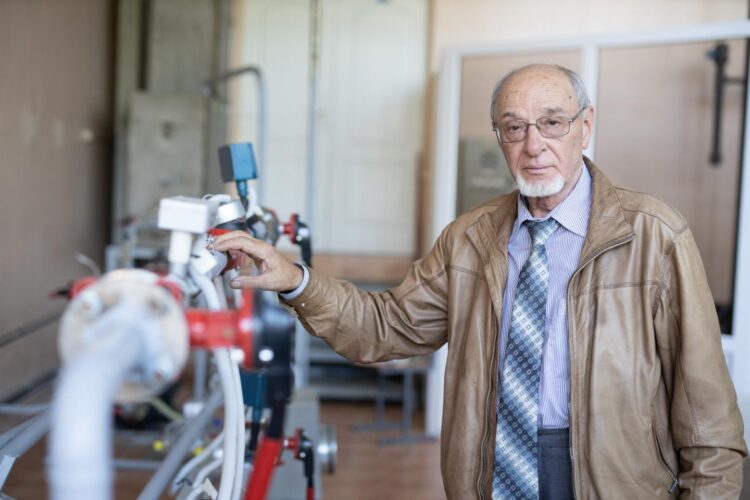Technology is economical, safe, environmentally friendly, and energy-efficient

Credit: UrFU / Ilya Safarov
Professors at Ural Federal University (UrFU, Russia) Sergey Shcheklein and Aleksey Dubinin have developed a technology for generating energy for an electric car engine using methanol. An article describing the technology was published in the International Journal of Hydrogen Energy.
“We pour methanol into the fuel tank. An air converter, which processes methanol into a gas mixture, is installed directly inside the vehicle. A mixture or synthesis gas, consisting of hydrogen and carbon monoxide, is formed in a small volume, which is necessary for the current operation of an electric vehicle engine,” said Sergey Shcheklein, head of the Department of Nuclear Power Plants and Renewable Energy Sources at UrFU.
The synthesis gas is fed to an electrochemical generator based on a solid oxide fuel cell (SOFC). Hydrogen is oxidized in the SOFC anode, the energy of this chemical reaction is converted into electrical energy. Carbon monoxide enters a separate combustion chamber, where it is oxidized by air with the release of thermal energy. Thermal energy is used to vaporize methanol and heat the catalyst involved in the conversion of methanol into a gas mixture. Emissions of residual carbon dioxide are insignificant.
Methanol is a non-explosive substance, the simplest alcohol, its production is not expensive: methanol can be obtained from any organic resources, including plant biomass and solid domestic waste. At the same time, the electrical efficiency of a power plant with SOFC is more than 42%, which corresponds to the level of the best promising internal combustion engines. For comparison: efficiency, i.e. the efficiency of converting the energy of liquid and gaseous fuels into mechanical energy, of diesel engines is 25%, for gasoline engines – about 20%.
Sergey Shcheklein and Aleksey Dubinin came up with the idea of using methanol after analyzing more than 220 experiments. Scientists have tried to obtain synthesis gas from various natural hydrocarbon fuels: coal, gas, oil products. Development using methanol turned out to be technologically simple, with minimal energy consumption and energy losses, and high efficiency.
“In other words, less fuel and oxidizer are required to produce a unit of energy compared to existing internal combustion engines. Consequently, less air is consumed from the atmosphere, significantly fewer combustion products, such as carbon dioxide and the life-threatening nitrogen dioxide, are formed,” said Sergey Shcheklein.
Besides, methanol is suitable for one another task that UrFU scientists are solving – to use nuclear energy sources for the production of “raw materials” for SOFCs.
Conversion of hydrocarbon fuels into gas mixtures requires high temperatures, which modern light-water nuclear reactors cannot provide; their thermodynamic potential is almost half as much. At the same time, obtaining methanol from methane using modern nuclear reactors (such as fast neutron reactors) is not only possible but also the most energetically efficient way.
The methanol processing technology proposed by Sergey Shcheklein and Alexey Dubinin is also suitable for the energy and metallurgical industries. This work is part of the five-year project “Thermodynamic Analysis of Hydrogen Use for Metallurgical and Power Engineering Enterprises,” which was carried out under a state assignment from the Ministry of Science and Higher Education of the Russian Federation.
Note
According to scientists, given the current level of oil and gas consumption, these sources of energy will be enough for mankind for the next 60 years. At the same time, the development of new deposits of fossil fuels leads to the degradation of production areas, including the Arctic, to the melting of permafrost and the release of colossal volumes of methane. This enhances the greenhouse effect and ozone depletion. The problem is the emissions of hydrocarbon fuel combustion products lead to environmental pollution.
One of the alternative methods of generating electricity is the use of solid oxide fuel cells. SOFCs are environmentally friendly devices with high, up to 70%, and higher efficiency, in which chemical energy is converted into electricity.
Solid oxide fuel cells function on hydrogen fuel. Hydrogen is the most abundant element, its reserves are inexhaustible, and it is environmentally friendly. The use of hydrogen in conjunction with electrochemical power generators opens up great prospects for the creation of electric transport, increasing the energy efficiency and environmental safety of vehicles of any scale. In this case, emissions of harmful substances either have zero values or are tens and hundreds of times less.
However, it is rather difficult to obtain pure hydrogen, since it easily enters into chemical reactions. In addition, hydrogen is characterized by high fluidity, large specific volume in the gaseous form, high potential explosion hazard, and requires complex technologies for storage and transportation. At the same time, the existing methods for producing hydrogen are energy-intensive and require large amounts of electrical energy. Its traditional source is power plants that run on coal, gas, and oil. Thus, the benefits of using hydrogen are significantly leveled, and a large-scale application of hydrogen technologies in transport is not yet possible. However, the prospects for producing hydrogen to obtain atomic and hydraulic energy, all types of renewable energy sources have the opportunity to eliminate these disadvantages and realize all the advantages of hydrogen fuel already in the 21st century.
###
Media Contact
Anna Marinovich
[email protected]
Original Source
http://urfu.
Related Journal Article
http://dx.





